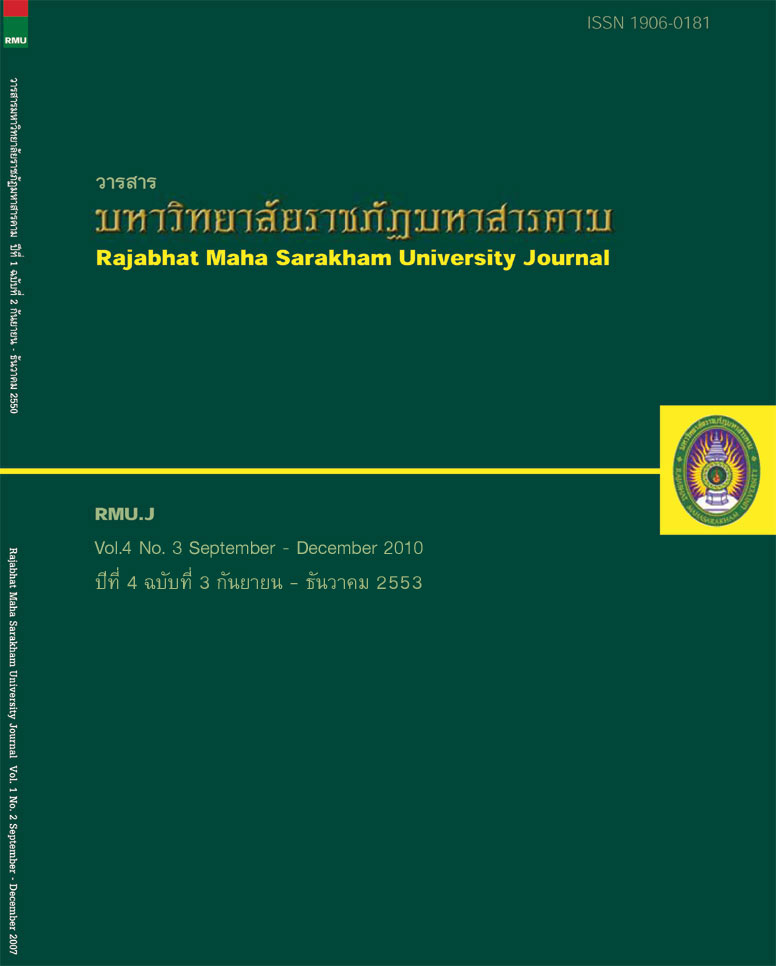ผลการเรียนโดยใช้บทเรียนบนเว็บที่มีต่อผลสัมฤทธิ์ทางการเรียน และเจตคติต่อวิทยาศาสตร์ กลุ่มสาระการเรียนรู้วิทยาศาสตร์ เรื่อง การดำรงพันธุ์ของสิ่งมีชีวิต ของนักเรียน ชั้นประถมศึกษาปีที่ 5 The Effects of Web-based Instruction on Learning Achievement
Main Article Content
บทคัดย่อ
การวิจัยครั้งนี้จึงมีวัตถุประสงค์ ประการแรก เพื่อพัฒนาบทเรียนบนเว็บ เรื่อง การดำรงพันธุ์ของสิ่งมีชีวิตที่มีประสิทธิภาพตามเกณฑ์ 80/80 ประการที่สอง เพื่อหาค่าดัชนีประสิทธิผลของบทเรียนบนเว็บที่พัฒนาขึ้น ประการที่สาม
เพื่อเปรียบเทียบผลสัมฤทธิ์ทางการเรียน ของนักเรียนที่เรียนโดยบทเรียนบนเว็บ กลุ่มสาระการเรียนรู้วิทยาศาสตร์
เรื่อง การดำรงพันธุ์ของสิ่งมีชีวิต หลังเรียนและก่อนเรียน ประการที่สี่ เพื่อศึกษาเจตคติต่อวิทยาศาสตร์ของนักเรียนที่มีต่อการเรียนด้วยบทเรียนบนเว็บที่พัฒนาขึ้น และประการที่ห้า เพื่อศึกษาความพอใจของนักเรียนที่มีต่อการเรียนด้วยบทเรียนบนเว็บที่พัฒนาขึ้น กลุ่มตัวอย่าง คือ นักเรียนชั้นประถมศึกษาปีที่ 5/1 โรงเรียนอนุบาลศรีเชียงใหม่ ภาคเรียนที่ 2 ปีการศึกษา 2552 ได้จากการสุ่มอย่างง่าย (Simple Random Sampling) เครื่องมือที่ใช้ในการวิจัยประกอบด้วย บทเรียนบนเว็บ แบบทดสอบวัดผลสัมฤทธิ์ทางการเรียน แบบวัดเจตคติต่อวิทยาศาสตร์ และแบบวัดความพอใจ สถิติที่ใช้ในการวิเคราะห์ข้อมูล คือ ร้อยละ ค่าเฉลี่ย ส่วนเบี่ยงเบนมาตรฐาน และการทดสอบสมมติฐานใช้ t-test ผลการวิจัยพบว่า
บทเรียนบนเว็บที่พัฒนาขึ้นมีประสิทธิภาพเท่ากับ 80.17/80.11 มีดัชนีประสิทธิผลเท่ากับ 0.6434 นักเรียนที่เรียนด้วยบทเรียนบนเว็บเรื่อง การดำรงพันธุ์ของสิ่งมีชีวิต มีผลสัมฤทธิ์ทางการเรียนหลังเรียนสูงกว่าก่อนเรียน อย่างมีนัยสำคัญทางสถิติ
ที่ระดับ .01 มีเจตคติต่อวิทยาศาสตร์อยู่ในระดับสูง และ มีความพึงพอใจอยู่ในระดับสูง
The purposes of the research were to 1) develop web-based instruction (WBI) in science for Prathomsuksa 5 to meet the efficiency value (E1/E2) of 80/80; 2) study the effectiveness index of the developed WBI in science for Prathomsuksa 5; 3) compare the students' learning achievement in science for Prathomsuksa 5 before and after studying using the developed WBI; 4) study the students' attitude towards science after learning using the developed WBI; and 5) investigate the students' satisfaction after learning using the developed WBI. The sample consisted of 30 Prathomsuksa 5 students studying at Anuban Srichaingmai School, obtained through the simple random sampling technique. The experiment was conducted in the second semester of the academic year 2009. The instruments used for data collection were the developed WBI, an achievement test, a scale on attitude towards science, and a questionnaire on satisfaction. The statistics used for data analysis were percentage, mean, and standard deviation. t-test (dependent sample) was used for testing hypothesis.
The research results were as follows:
1) The efficiency value (E1/E2) of the developed web-based instruction (WBI) in science was 80.17/80.11, higher efficiency than the required criteria.
2) The effectiveness index of the developed WBI was 0.6434, meaning that the students progressed their learning at 64 percent.
3) Learning achievement of the students after learning using the developed WBI was higher than before learning at the .05 level of significance.
4) The students' attitude towards science after learning using the developed WBI, as a whole, was at a high level.
5) The students' satisfaction after learning using the developed WBI, as a whole, was at a high level.
Article Details
1. บทความที่ลงตีพิมพ์ทุกเรื่องได้รับการตรวจทางวิชาการโดยผู้ประเมินอิสระ ผู้ทรงคุณวุฒิ (Peer Review) สาขาที่เกี่ยวข้อง อย่างน้อย 3 ท่าน ในรูปแบบ Double blind review
2. ข้อคิดเห็นใด ๆ ของบทความที่ลงตีพิมพ์ในวารสารมหาวิทยาลัยราชภัฏมหาสารคาม นี้เป็นของผู้เขียน คณะผู้จัดทำวารสารไม่จำเป็นต้องเห็นด้วย
3. กองบรรณาธิการวารสารมหาวิทยาลัยราชภัฏมหาสารคาม ไม่สงวนสิทธิ์การคัดลอกแต่ให้อ้างอิงแสดงที่มา


